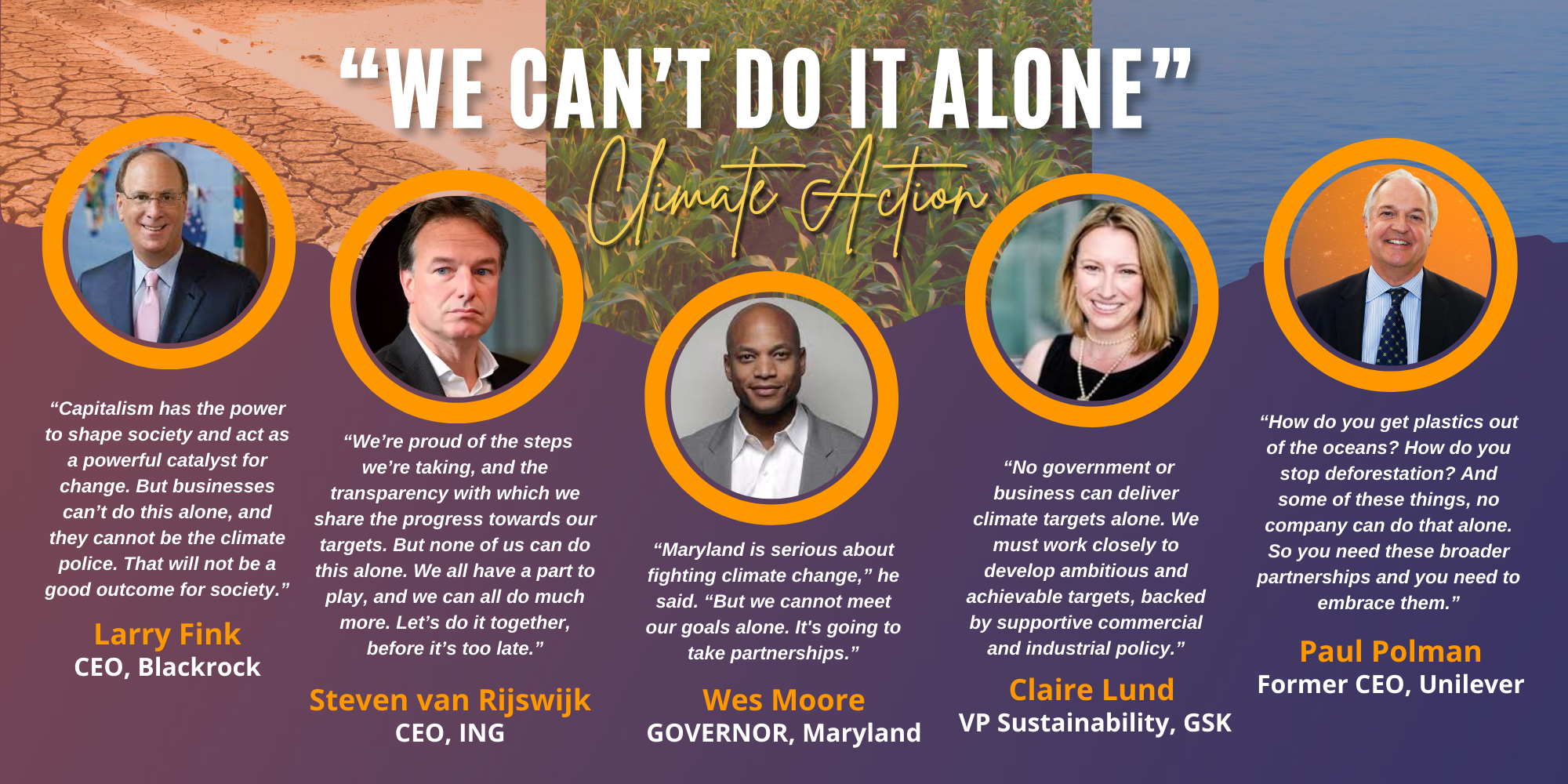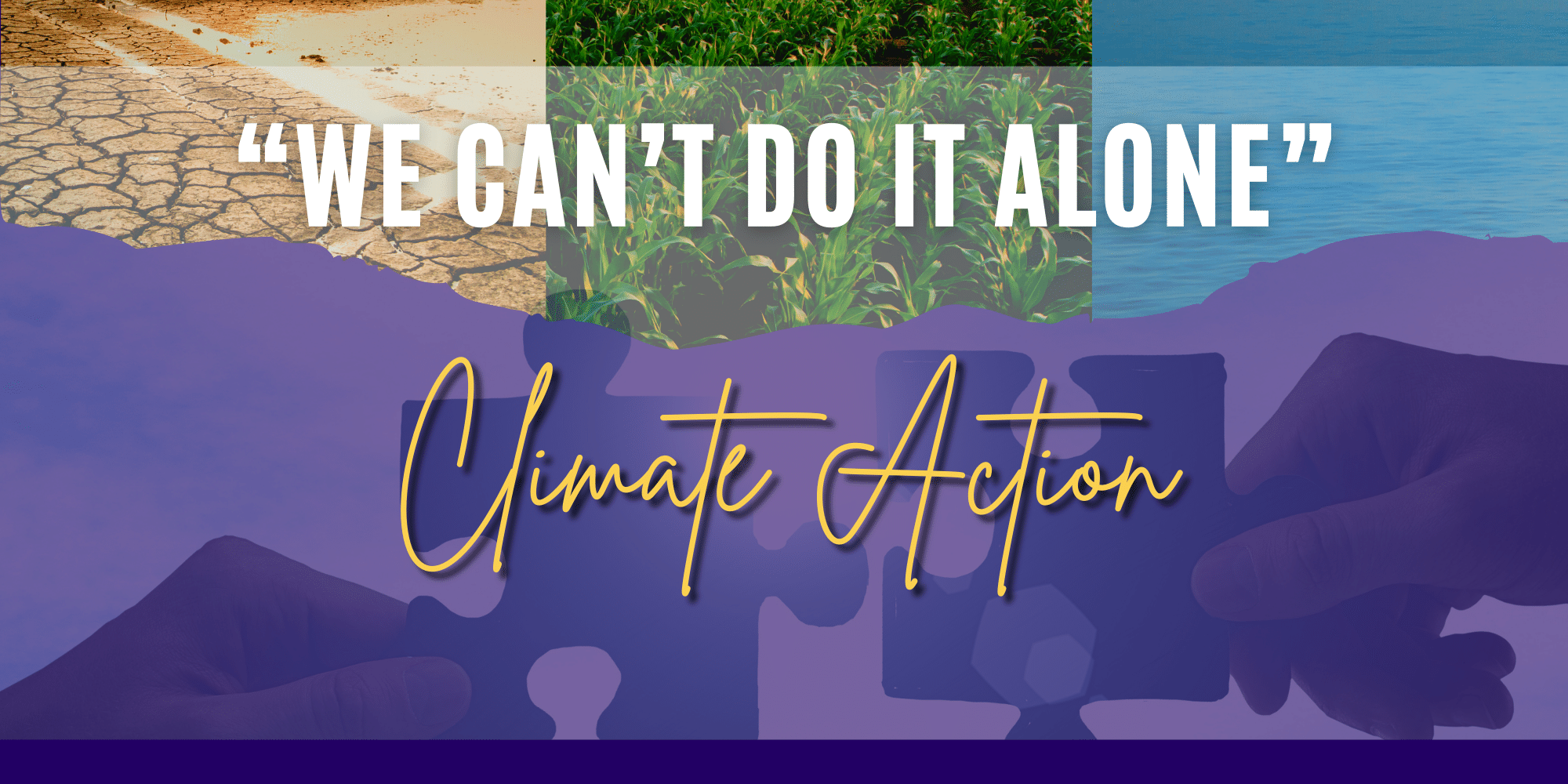For those of us who were watching, listening, and observing COP28 from afar, one central theme seemed to emerge around discussions about not only pathways to mitigating climate change and reaching net zero commitments, but also approaches and just, inclusive solutions to advancing adaptation and resiliency. Essentially governments, companies, organizations, and communities recognize when it comes to addressing the complex challenges before us, they can’t do it alone.
For example, in an announcement of a new Industrial Transition Accelerator (ITA) for Heavy-Emitting Industries backed by $30M from Bloomberg Philanthropies and the COP28 Presidency, Faustine Delasalle, Chief Executive Officer of the Mission Possible Partnership and Executive Director of the ITA Secretariat said of the “flywheel of collaboration” the ITA presented as a conduit for change, “We have clarity on what we need to do and where we need to be by 2030 to decarbonise the heavy emitting sectors in line with the Paris Agreement. But time is not on our side, and the pipeline of necessary near-zero projects is falling short because industry can’t do it alone.”
In their collective letter preceding the event, the We Mean Business Coalition and its partners, including 200+ companies representing over $1.5 trillion in global annual revenue, urged national governments to address the primary cause of climate change: burning fossil fuels. In referencing the transition to net zero, “We cannot make this transition securely or efficiently alone. Financial institutions, fossil fuel producers and governments all have crucial roles to play.”
There was even a side event at this year’s COP UAE entitled “Credible and accountable climate commitments: we can’t do it alone”
This rhetorical framing at COP28 around the impossibility of solving problems in isolation is hardly new, as evidenced by this collection of quotes from corporate and other leaders speaking of the challenges the private sector is also facing, below:
Despite this widespread recognition that “we can’t do it alone” regarding challenges and opportunities around sustainability, biodiversity, climate, and greater social impact, the practical implementation of partnerships often lags behind the rhetoric. Many firms are moving forward on their commitments with varying levels of success. As they do, they often keep coming back to the contemplation of achieving more (or at least more meaningful outcomes) with and through a larger group of partners.
Although this need is often identified, what might be preventing organizations from undertaking partnership work in the fight for a sustainable future? The answer lies in several complex factors, including:
- Fear of competition: Companies may be hesitant to share resources and knowledge with competitors, fearing a loss of competitive advantage.
- Lack of trust: Building trust between different stakeholders, particularly those from diverse backgrounds and sectors, can be a lengthy and challenging process.
- Limited resources: Businesses often face pressure to prioritize short-term financial goals over long-term sustainability investments, leaving little room for collaboration.
- Lack of infrastructure: The current landscape lacks dedicated platforms and structures to facilitate effective partnerships for sustainability.
There is a bit of a paradox here because many of these challenges are also primarily solved through collaboration. Addressing these challenges requires a paradigm shift. We need to move away from the siloed approach and embrace collaboration as a fundamental pillar of our sustainability efforts. This requires a multifaceted approach that includes:
Pre-competitive collaboration: Despite trepidation over sharing knowledge and ideas with competitors, pre-competitive collaboration involves two or more companies operating within the same industry, coming together to address a shared problem or pain point that doesn’t impact direct business competition or contribute to unfair advantage.
Fostering trust: Building genuine relationships based on mutual respect and shared goals is essential for successful partnerships. It takes time, and conversation, but this upfront investment in the relationship can often lead to more efficient and productive returns in the long run.
Providing resources: Investing in dedicated platforms and resources can provide the necessary infrastructure for building and managing successful partnerships. And resources mean more than financial investment; often partners are most useful when they bring their own expertise to a group that benefits from that expertise.
Leveraging technology: Utilizing technology can facilitate communication, collaboration, and knowledge sharing between partners.
In addition to these foundational requisites for good partnership development, critical to overall, long-term partnership success is the active engagement and involvement of a partnership facilitator – a specialized entity that serve as neutral conveners, bringing together diverse stakeholders to identify shared goals, develop collaborative initiatives, and overcome the challenges mentioned earlier.
What is a Partnership Facilitator?
A partnership facilitator is a neutral third party who helps groups work together effectively by building trust, facilitating communication, and generating creative solutions. They bridge power imbalances and keep partnerships on track, ultimately increasing the likelihood of success.
Resonance has a long history of designing, managing, and implementing partnerships, particularly those where localization and co-creation are critical to delivering outcomes and contributing to transformational change. Although each partnership is unique, and thus our role as interlocutor is tailored for each, there are generally key roles and responsibilities partnership facilitators undertake to ensure partnership success
The Roles Partnership Facilitators Play
Drawing from the extensive work of Resonance in designing, managing, and implementing cross-sector partnerships, Resonance Chief Innovation Officer (CIO) Steve Schmida outlines in his book, Partner with Purpose, the vital roles and functions partnership facilitators play. Contextualizing based on additional insights from our teams, these include:
Identifying potential and appropriate partners: This is the first step towards a successful collaboration. Partnership facilitators possess a keen understanding of the landscape, often from working in multiple sectors at one, enabling them to identify and connect businesses, NGOs, governments, and other potential stakeholder partners whose strengths and expertise complement each other. This ensures that the partnership is well-matched and positioned for success.
Mediating conflicts and facilitating constructive dialogue and understanding: Facilitating communication for understanding and action is the bedrock of successful collaboration. Partnership facilitators break down communication barriers, ensuring all voices are heard and understood. They translate technical jargon and cultural nuances, fostering a shared language that promotes clear and concise communication. In this process, Building Trust is crucial, especially in situations with historical disagreements or power imbalances. As independent third parties, partnership facilitators act as neutral ground, gaining the trust of each party by demonstrating objectivity and understanding their individual goals. This trust empowers parties to engage openly and honestly, fostering a collaborative environment.
Helping partners generate and design creative solutions: These processes can be difficult at first when potential partners are not familiar with each other’s way of doing business. This can be a great challenge to have—it shows that partners have unique perspectives and can likely benefit from learning to work with each other.
In understanding each partner's strengths and weaknesses, facilitators orchestrate co-creation workshops, brainstorming sessions, and other collaborative exercises, building on the divergence and creativity of multiple perspectives, and converging on ideal approaches. This not only fosters innovative solutions, but also leverages each partner's unique expertise, leading to more robust and sustainable outcomes. At times, this can be essential since partners may not see each other on the same level. Thus, Bridging Power Imbalances is essential for creating a level playing field. Partnership facilitators ensure all parties have equal opportunity to participate and contribute, regardless of their size, resources, or perceived influence. This ensures that each voice is valued and that solutions are truly collaborative, not dictated by the dominant partner.
Optimizing ‘Best Practice’ Processes: In addition to facilitating processes around solutions design and implementation, partnership specialists are also critical in designing, maintaining, and improving systems and processes that yield better partnership relationships and long-term functionality. The independent roles of facilitators position them well to effectively help partners negotiate their respective interests and objectives for the benefit of collective outcomes and deliverables. They provide structure and organization to the process, ensuring that deadlines are met, and milestones are achieved. They anticipate potential challenges and proactively guide discussions to overcome obstacles, keeping the collaboration on track and focused on achieving partnership goals.
Partnership facilitators also provide expertise on HOW to collaborate effectively as a best practice, another valued contribution they bring to the table. They may offer training and guidance on communication, conflict resolution, and negotiation techniques, equipping partners with the skills necessary to navigate challenges and maximize their collaborative potential.
Monitoring progress: Tracking the success of partnership initiatives and identifying areas for improvement is critical across the duration of collaboration. Partnership facilitators with immersive experience in USAID-supported work are familiar with building into partnership design not only appropriate theories of change as guidance, but also systems of monitoring, evaluation, and learning (MEL) that contribute to quality data generation and capture, case-building, and greater impact. The growing involvement of the private sector in cross-sector and pre-competitive partnerships is propelling to an even greater extent requirements for evidence-based documentation of impact across projects to justify investment and champion initiatives.
Sharing best practices: Given their neutrality and process roles, partnership facilitators are often tasked with disseminating knowledge and experience gained through successful partnerships to inspire and guide others. This may be done on behalf of the partnership itself across the duration of project activities, or may be inherent in building out a more robust community of practice intended to endure beyond the partnership itself.
Given this level of role and responsibility, partnership facilitators are not simply observers; they are active architects, meticulously crafting the foundation for successful partnerships. By facilitating communication, building trust, generating creative solutions, bridging power imbalances, and keeping collaboration on track, they empower partners to achieve their shared goals and create a lasting impact.
The Growing Need for Partnership Facilitators
The complex and interconnected challenges of our time demand collective action. We know these issues will impact us all. "We can't do it alone," also inherently emphasizes a crucial truth: we have to do this together. Collaboration is not just an option, it's the only path to a more sustainable and equitable future. From our involvement in managing global development alliances (GDAs), cross-sector initiatives, and pre-competitive collaborations, Resonance believes we have the potential through partnerships to unlock the collective potential within our communities, create innovative solutions, learn from each other's experiences, and amplify our voices. Partnership facilitators are essential players in these transformative efforts.
Learn more about Partnership Facilitators/Specialists from these Related Insights:
What is Partnership Development?
What is a Partnership Specialist?
5 Interview Questions to Ask When Hiring a Partnership Specialist


